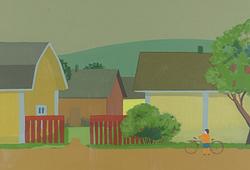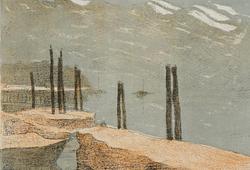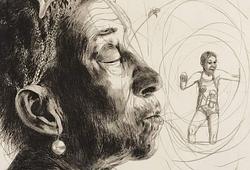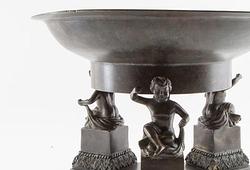Leander Engström
"Varitédansöser" (Dancers)
Signed Leander Engström. Executed around 1912. Canvas 118 x 61 cm.
Provenance
Private collection (probably acquired directly from the artist in the 1910's).
Hence by descent.
Bukowski Auktioner, Stockholm, Sale 566, "Moderna vårauktionen", 25 April 2012, lot 17.
Private collection.
Exhibitions
Liljevalchs Konsthall, Stockholm, "Expressionistutställning", catalogue no 12, May 1918, no 5.
Svensk-Franska Konstgalleriet, Stockholm, "Retrospektiv utställning - Leander Engström", 1937, probably no. 44 ("Dansöser").
Riksförbundet för bildande konst, 1938-39.
Prins Eugens Waldemarsudde, Stockholm, "Leander Engström", 1986, no. 9.
Museet Kulturhuset, Borås, Sweden, "Leander Engström", 1986-87, no. 9.
Liljevalchs konsthall, Stockholm, "Den stora färgskrällen", 4 October 2008 - 6 January 2009, no. 245.
Literature
Konstbiblioteket (Art Library), Nationalmuseum (National Gallery), Stockholm, public archive, with title "Dansösen", no. BH 211, reproduced.
More information
.
Artist
Per leander Engström was a Swedish visual artist born in Ytterhogdal. He studied under the tutorship of Henri Matisse in Paris and the artists association school in Stockholm. Engström was part of the artistic group De Unga together with none other than Isaac Grünewald and Tor Bjurström. Engström was greatly inspired by Paul Gauguin, Vincent van Gogh and Paul Cézanne. Leander Engström followed in Osslund's footsteps and was captivated by Lapland's overwhelming natural scenery, which he depicted using the forms and colors of Fauvism. His paintings from 1912-15 - landscapes, still lifes, nude scenes - are harmonious and emotional, built upon Cézannes principles of discrete, weak colours. The years between 1916 and 1919 kan be understood as his most expressionistic period. Sweeping lines, large stylised planes and bright strong colours dominated his characteristic style. Engström found himself in Italy between 1920 and 1922 where he studied the early Rennaissance; it was during this time that he neared new objectivity. Leander Engström was one of Matisse's most impressive pupils.
Read more



































